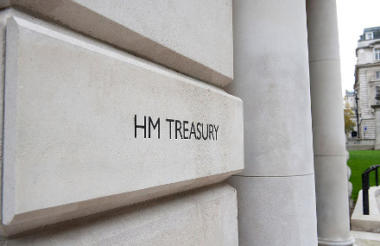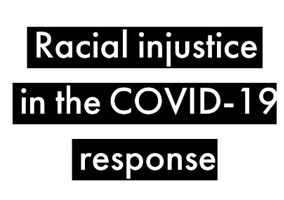Yesterday the chancellor of the exchequer announced £750m in new funding for charities.
After a month of urging the Treasury to create a financial package for the sector, charities welcomed the announcement but said it will not be enough and called on the Treasury to keep the funding under review.
There are also questions around eligibility and how the money will be distributed.
Rishi Sunak committed £350m to smaller community charities, some of which will be distributed using the National Lottery's Reaching Communities England fund.
Infrastructure
Charities Aid Foundation: ‘We must recognise that there is still a long way to go’
John Low, chief executive of CAF, said: “CAF has seen first hand how charities on the front line are facing incredible demands for their services at the same time as income is squeezed.
“Our own CAF Coronavirus Emergency Fund for small charities had almost 5,000 applications in just one week from the very organisations across the UK helping people to get through this bleak time. This package of measures from the government will bring important support at such a difficult time, although we must recognise that there is still a long way to go.
“I am especially pleased to see the Treasury recognising the humbling generosity of the British public with match funding for the BBC’s Big Night In and the National Emergencies Trust. This speaks strongly to the power of what can be achieved when we join forces.”
NCVO: 'Even many that survive will look very different in a few months’ time'
Karl Wilding, chief executive of NCVO, said: “With charity shops shut and fundraising events cancelled, we estimate charities stand to lose around £4bn in 12 weeks as a result of the crisis. We have been pushing for government support because we know how many people and communities rely on the services charities provide, many of which are now at risk.
“Today’s announcement is an important first step, though it will not be enough to prevent good charities around the country from closing their doors. Even many that survive will look very different in a few months’ time, with a severely reduced capacity to provide the support that people rely on.
“At a time of crisis, charities want and need to be able to give their all to supporting people who need it most. They cannot do that if they have to suspend their work or close altogether. We know this is not something that the government wishes to see any more than we do, so we will continue to push for the support needed so that charities can keep serving the public.
“We would welcome a commitment from the government to review the level of this support as the crisis continues.”
Charity Finance Group: 'We need a commitment from government to review this support'
Caron Bradshaw, chief executive of the Charity Finance Group, said: “Across the sector we have pulled together to ensure that government came forward with a package to enable charities to keep operating to support communities and deliver the services on which they rely, and although it's taken the government over three weeks to acknowledge and respond to the need charities are experiencing, this package looks like the first steps of support for those charities which are directly involved in the immediate Covid-19 response.
"However, we will be considering the detail of what’s been put forward before we can say whether the government package offers the protection the people we serve so desperately need. We need a commitment from government to review this support as the crisis continues".
NAVCA: ‘It doesn't begin to meet the medium and longer term need to support the wider charity sector’
Jane Ide, chief executive of NAVCA, said: “Today's announcement from the chancellor on funding for frontline charities is helpful and urgently needed - but it doesn't begin to meet the medium and longer term need to support the wider charity sector, which is playing an equally critical role in maintaining vital services now and in the future for people in need.
“Funding for smaller charities will need to be available very quickly and easily to ensure they can continue to operate in their local communities. We'll be looking at the detail to understand more about how and where this funding can be used."
Institute of Fundraising (IoF): ‘Unlikely to be enough to safeguard many essential services’
Peter Lewis, chief executive of the IoF, said: “Today’s announcement of a £750m funding package to help charities maintain their vital services and respond to the coronavirus crisis is a welcome first step. It will help to provide much-needed immediate support to many charities providing essential services around the UK.
“It is, however, far lower than the £4bn charities are predicting in lost income in the months to come, and is therefore unlikely to be enough to safeguard many essential services.
“We believe charities have a key role to play in getting us through this crisis, and appropriate financial support from government, alongside fundraised income, will be critical in the weeks and months ahead. We will continue to track the impact of the crisis on our members and the services they provide, and will continue to share our insight with government as to where there are gaps in income are, and where services are under threat.”
New Philanthropy Capital (NPC): ‘Applying for this relief should not become another challenge charities are facing’
Dan Corry, chief executive of NPC, said: “The chancellor’s announcement of support for charities today, although less than many charities expected, is nevertheless welcome. The key thing now is to understand how this money will reach charities, especially small charities, quickly so they can make use of it to tackle the crisis. Applying for this relief should not become another challenge charities are facing.”
“We urge transparency about where the money goes, so that independent funders and philanthropists can support the government’s efforts and encourage the government to keep up its support; for instance, the Coronavirus Business Interruption Loans scheme should be amended to allow all charities to be eligible".
Voluntary Organisations Disability Group (VODG): ‘The pressures on services are mounting’
Rhidian Hughes, chief executive of VODG, said: “Voluntary sector providers play a key role in supporting the 13.3 million disabled people living in the country. The chancellor’s announcement of funding to support the essential work of charities is a welcome first step towards ensuring people are not left without.
“The pressures on services are mounting, however, both in terms of demand and rising costs. Now is the time to invest in a sector and strengthen communities for the benefit of us all.”
Social Enterprise UK: ‘It will only cover at best a small minority’
Peter Holbrook, chief executive of Social Enterprise UK, said: “The government has announced a package of support for charities and we understand that this will also cover some social enterprises, although some may be excluded due to restrictions on eligibility.
“We welcome this £750m fund as a significant measure but when compared with the size of the charity and social enterprises sectors, it will only cover at best a small minority. It also does not give social enterprises parity with other parts of the economy which have receive large amounts of support. Social enterprises should not be penalised because of the tough environments they work in and the challenges they face in trading for purpose.”
“We remain concerned that thousands of social enterprises delivering key services in local communities, employing and working with vulnerable people and operating in the most deprived areas will go without support. Many good businesses will close unless the government takes a broader approach.”
Locality: ‘It is currently unclear how the money will be targeted’
Tony Armstrong chief executive of Locality, said: “We are pleased that the government has recognised that at this time of national crisis, they must provide funding for those organisations who are supporting our communities through it. It’s vital that this new funding reaches community organisations quickly.
“It is currently unclear how the money will be targeted, which organisations and services will be eligible for support, and how quickly the money will get to organisations who are on the brink. We will work with government to ensure that this funding is spent wisely, but also continue to make the case that additional support is needed.
“Not least, we need urgent changes to the furloughing scheme to allow more charities to make use of it. Many of these organisations cannot shut up shop and wait for the crisis to be over, like some businesses can, because they are out there every day supporting their communities.”
Unite: ‘Charities are already announcing they are going insolvent’
Siobhan Endean, national officer for the community, youth and not for profit sector at the trade union Unite, said: “The chancellor Rishi Sunak’s package of £750m is a welcome first step and a recognition that the sector is reeling financially.
“But, in our view, much more needs to be done, and a figure closer to £4bn is what is needed to see the sector through the short-term crisis and to stave off charities closing and also, in the longer term, to nurse charities back to financial health.
“Charities are already announcing they are going insolvent and most charities have reserves that will tide them over for less than three months.
“We will be strongly lobbying government in the weeks ahead with cogent arguments and examples to make the case for the extension of the financial measures that we believe necessary to support charities and the many vulnerable people they help on a daily basis
“Many of those charities at risk are a lifeline for people and families in need particularly at this time of national crisis and they will certainly need them when we emerge from this frightening period.”
ACEVO: 'It will not be enough to save every charity'
Chief executive of ACEVO, Vicky Browning, said: “This announcement will help some charities continue their vital, life saving services during the pandemic, but unfortunately, as the chancellor acknowledged, it will not be enough to save every charity.
“When a charity closes, it is the people they work with that are harmed and we believe every possible step should be taken to prevent people from experiencing harm because of this pandemic. This is a first step, but it is a fraction of what is needed to meet the scale of the crisis that communities are facing. We hope to continue to work with the treasury and DCMS to build on this foundation.”
Charity reaction
Hospice UK: 'Working with the NHS to disburse this much-needed funding'
Tracey Bleakley, chief executive from national charity Hospice UK, said: “Hospice UK is delighted that the government is providing up to £200m of funding per quarter to hospices to help support the NHS and respond to the Covid-19 emergency.
“Hospices depend on the generosity of their local communities to care for people and families affected by terminal illness. This incredible government support is very welcome, but it’s still important that people continue to support their local hospice.
“Hospice UK is working with the NHS to disburse this much-needed funding as soon as possible so we can continue to protect the most vulnerable people in our country during this national emergency.”
Macmillan Cancer Support: ‘We need comprehensive, sustained support for the charity sector’
Lynda Thomas, chief executive at Macmillan, said: “This initiative is a first step, but it doesn’t go far enough to provide the relief needed by the charity sector which has been hit hard by the impact of Covid-19.
“The NCVO set the government a target of £4bn to help support charities and we are deeply concerned this commitment fails to recognise the scale of the challenge. It won’t prevent many of the nation’s charities cutting the support they provide when it is needed most, or even being forced to close.
“We need comprehensive, sustained support for the charity sector whose ability to continue to play a central role in the national response to coronavirus is under threat by spiralling demand and collapsing incomes.”
The Brain Tumour Charity: ‘We know this is not nearly enough to support so many vital charities’
Sarah Lindsell, chief executive of The Brain Tumour Charity, said: “The entire charity sector, like so many other organisations and industries in the UK, is facing an unprecedented threat to their everyday operations.
“We are seeing sector-wide decimation of income, and disruption to the care we provide each day. The subsequent impact this has on research and vital support during the current crisis is a continuing and urgent issue.
“While we acknowledge the £750m pledged by the chancellor Rishi Sunak, we know this is not nearly enough to support so many vital charities at the frontline of maintaining support and care particularly for those with life limiting disease, during this crisis.”
Paces: ‘Charities are always innovating – they need to in order to survive’
Paces is a South Yorkshire specialist centre, charity and school for children and adults with cerebral palsy and motor disorders.
Chief executive Spencer Pitfield said: “We at Paces are doing our absolute best to support our children, adults and families during this national emergency. In these uncertain times, the fear for families living with a vulnerable child or adult can be absolutely overpowering.
“The help from the chancellor and the government is hugely welcome and will allow us to continue supporting our families both now – remotely via Skype, social media and on the telephone – and in the future when we can re-open our school and adult services.
“Charities are always innovating – they need to in order to survive, and we have done that since this crisis began. But there’s no escaping the fact that these are difficult times – funding has disappeared yet the need for our services is greater than ever. I hope this announcement allows us to continue delivering them, and I hope the money is delivered to us so we can do that as soon as possible.”
Muscular Dystrophy UK: ‘Clarity on how government departments will be allocating funding is essential’
Catherine Woodhead, chief executive at Muscular Dystrophy UK, said: “The measures announced today to support charities are welcome. We will be looking at the detail as it is released, but it is essential the services provided by charities like Muscular Dystrophy UK are not overlooked.
“We are providing vital guidance, support and advocacy for the tens of thousands of people in the UK living with muscle-wasting conditions who are a highly vulnerable group during the coronavirus pandemic.
“We receive no government funding for our core services, which are funded entirely through voluntary funds, so clarity on how government departments will be allocating funding is essential. The £2.8m loss to our fundraising income from the impact of coronavirus put our frontline services and charity at risk.
“We are also concerned that as a national organisation we may not be able to draw on the support that will be available through the National Lottery Community Fund to help us continue to support the people who rely on us.”
Sense: ‘We welcome the chancellor’s powerful words on the importance of the voluntary sector’
Richard Kramer, chief executive of national disability charity Sense, said: “We welcome the Chancellor’s powerful words on the importance of the voluntary sector in keeping communities together.
“As he acknowledged, charities like Sense are on the front line supporting disabled children, adults and families that would otherwise not be reached. We therefore welcome today’s funding announcement, as a first step in addressing the scale of the challenges. We now need to work together in partnership so that charities can continue to work in this crisis.”
Related articles
Coronavirus: What charities need to know
Latest news, analysis and advice about the coronavirus for charities and social enterprises.













